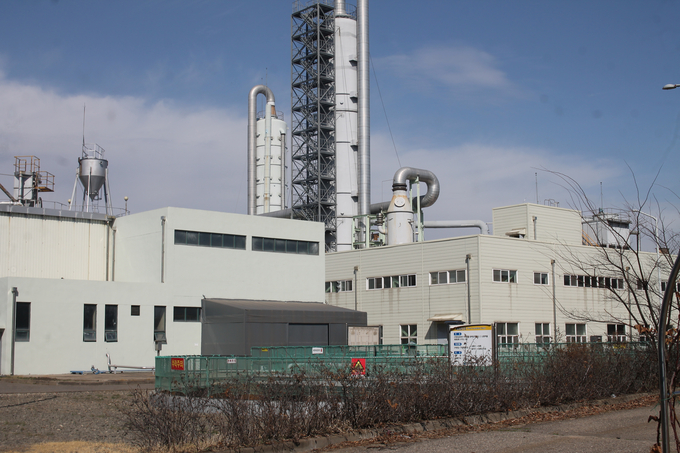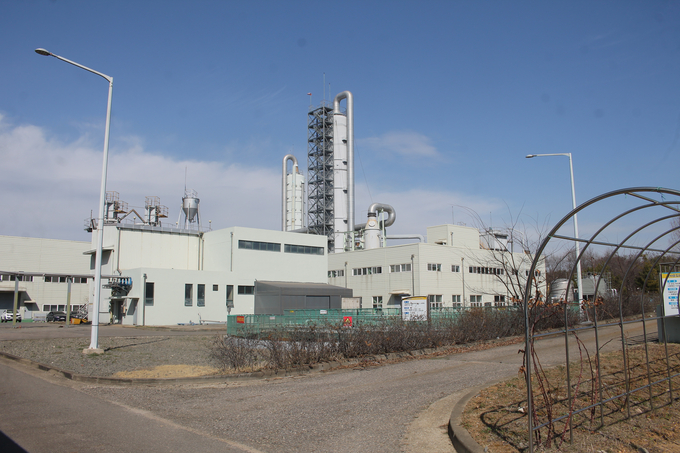November 27, 2025 | 22:04 GMT +7
November 27, 2025 | 22:04 GMT +7
Hotline: 0913.378.918
November 27, 2025 | 22:04 GMT +7
Hotline: 0913.378.918
The plant boasts advanced technologies to utilize emissions and landfill leachate for clean power production.
A delegation in their exchange course on bioenergy development came to South Korea to learn about bioenergy development and energy transition. The program was held under the framework of Project "The Climate Protection through Sustainable Bioenergy Markets in Vietnam" (BEM), which is launched by the German Federal Ministry for Environment, Nature Conservation, and Nuclear Safety through the International Climate Initiative Fund, the Department of Electricity and Renewable Energy (Ministry of Industry and Trade) and the German Organization for International Cooperation (GIZ) from April 2019 to September 2023.

The delegation of the EVN and BEM project visited a biomass power plant in Korea. Photo: Chu Khoi.
In South Korea, the delegation worked with officials from the ministry, departments, research institutes adn investors in the field of bioenergy projects. They are also taken to two biopower plants in South Korea namely the biomass power plant in Seoul and a biomass cogeneration plant in Gyeonggi.
We visited a plant that uses anaerobic digestion technology to produce power from landfill leachate, from the site owned by Sudokwon Landfill Management Company (SLC). The site was established under the Ministry of Environment of South Korea to promote the proper disposal of municipal solid waste, recovery, and protection of resources.
Throughout our visit, we were overwhelmed by the scale of dozens of hectares of biomass power plants. The horizontal lines of pieces of equipment such as tanks for storing and processing liquid waste into biogas, gas pipelines stretching and running for miles, high-rise silos decorated with friendly drawings promoting green life, massive turbines, generators, and biogas tanks, soaring chimneys among others.

A corner of SLC Company's biomass power plant in Sudokwon. Photo: Chu Khoi.
The technical staff of the plant shared that wastes from Seoul were transported to the Sudokwon landfill site. The SLC company then applies accumulated waste collection techniques and uses methane from landfills as fuel to run generators to minimize the impact on the environment.
The plant site added that domestic waste would be categorized into components such as paper, plastic, and polyester to produce Refuse Derived Fuel (RDF) pellet mills. The remaining organic components would be buried and landfill leachate would be collected to generate power. Meanwhile, industrial waste will be separated from iron and steel, the remaining concrete will be permanently buried. The cost of selling electricity is calculated annually, of which 30% is used for operation and maintenance, and the rest will be the company's profit.
Regarding the number of layers of waste buried at each landfill, the factory representative said that at each landfill and waste treatment, there are 8 layers of waste, each layer is 5m high and is buried for about 7-14 years, landfill capacity of each is 400,000m3. Currently, landfills that have reached their full capacity are used to build amusement parks and golf courses, bringing economic benefits to the company.

The Korean government pays great attention to infrastructure investment in urban waste treatment technology. Photo: Chu Khoi.
The amount of waste generated in Korea has increased by nearly 200% between 1996 and 2020 from 180,573 tons/day to 540,872 tons/day while the remaining capacity of incineration facilities and landfill sites is diminishing fast. From 2026, direct landfilling of combustible municipal solid waste will be banned in the Seoul metropolitan area with a schedule to expand nationwide in 2030.
To meet the growing demand for a better waste disposal system, the Seoul Metropolitan Government (SMG) has committed to providing innovative cleaning services and coming up with a waste disposal system, which can satisfy sanitation workers and the general public. The SMG is dedicated to managing waste to achieve a 71% recycling rate and 30% reduction in food waste, and to minimize landfill waste.

The Seoul Metropolitan Government is dedicated to managing waste to achieve a 71% recycling rate and 30% reduction in food waste, and to minimize landfill waste. Photo: Chu Khoi.
Most organic waste has been recycled as fertilizers in Korea, however, there are growing limitations in practical use of them. Therefore, government policies are also shifting to promote biogas production from organic waste with plans to include biogas in the RFS system and to increase RECs for biogas. The Korean government has set targets to reach carbon neutrality by 2050 and reduce GHG emissions by 40% from the 2018 levels by 2030.
It also completed the K-circular economy roadmap in 2021 and plans to increase the proportion of pyrolysis treatment to 10% by 2030 from the current 0.1% level. Korean companies, therefore, are looking for environment-friendly and efficient waste treatment solutions more than ever to cope with such challenges and also to embrace the new corporate management paradigm.
Implementing this policy of the South Korean Government, SLC Company has taken the lead in applying advanced and modern technology to the treatment of organic waste, turning it into a clean green energy source. Currently, many companies in Korea are also researching and looking for more efficient and environmentally friendly waste treatment solutions than ever before to deal with such challenges.
Translated by Linh Linh

(VAN) A new study reveals how the simultaneous effects of ocean acidification, salinity and loss of oxygen are making the world more fragile.

(VAN) Hopes are growing that the creation of the first 3D turkey gut model could be a turning point in the battle against the virulent blackhead disease.

(VAN) Tyson, America’s biggest meat supplier, plans to shutter one of its largest beef processing plants as the industry continues to struggle with low cattle supplies and political pressure from Washington.

(VAN) New FAO study shows how digital solutions are empowering farmers and fishers to prevent losses and build resilient agrifood systems.

(VAN) Brazil's COP30 presidency pushed through a compromise climate deal on Saturday that would boost finance for poor nations coping with global warming but that omitted any mention of the fossil fuels driving it.

(VAN) Poultry farmers in the UK have been warned that they could face one of the worst winters yet for bird flu.

(VAN) Prices of main-crop paddy have risen sharply, with jasmine rice hitting 16,100 baht per tonne — the highest level in years.